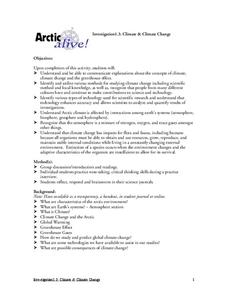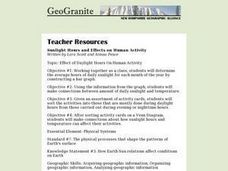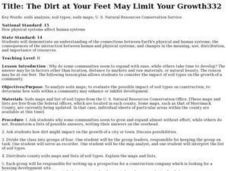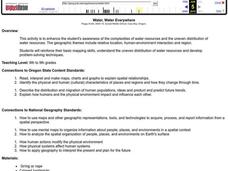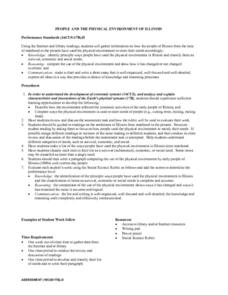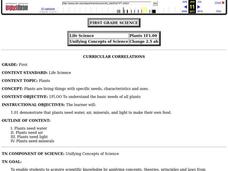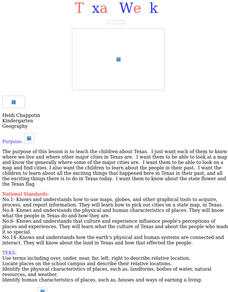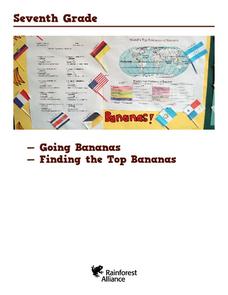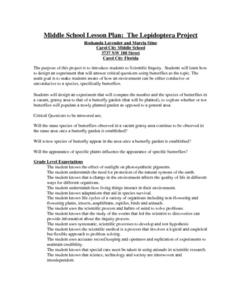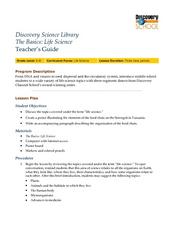Curated OER
Environment: Climate Change
Students explore climate change and the greenhouse effect. Using provided definitions, they assess local weather conditions and analyze long term climatic data for their areas. Once they explore the concept of and connection between...
Curated OER
Calculate Your Contribution
Students assess the environmental impact of their transportation choices. They keep a transportation journal and use a website to calculate vehicle emissions for themselves and their class. They evaluate their transportation choices.
Curated OER
Effect of Daylight Hours on Human Activity
Students determine the average hours of daily sunlight for each month of the year by constructing a bar graph. They develop a understanding of how the amount of daylight hours varies by month and how that affects both temperature and...
Curated OER
The Dirt at Your Feet May Limit Your Growth
Students examine how soils within a community may enhance or inhibit development. In small groups, they analyze county soils maps, and develop a prospectus for a construction company looking to construct a housing development site.
Curated OER
Simple Machines
Fifth graders study how simple machines can help us alter forces and discuss the term mechanical advantage. They then identify dysfunctional simple machines and discuss in groups how the dysfunctions will decrease the effectiveness of each.
Curated OER
"Heritage" - "Hey, That's the Name of Our School!"
Seventh graders gain a better understanding of the canal period in U.S. History, and more specifically, discern the importance of the Illinois and Michigan Canal on the development of Illinois as a state and Chicago as a prominent city.
Curated OER
National expansion of the United States (1815 to 1850), and its connection to local Illinois history.
Students discuss the importance of establishing the I & M Canal water route. They watch a video about the canal's history. They collect and write a personal migration story by interviewing a family member. They analyze trends and...
Curated OER
Site vs. Situation: Location! Location! Location!
Students examine places with a similar latitude to Alabama, and discuss the importance of a location's site versus its situation. They analyze maps, create a chart, and write a paragraph on the difference between site and situation.
Curated OER
Animals
Second graders discuss the term "endangered". They identify the reasons some animals are in danger of being wiped out. They discover ways humans can help the species survive.
Curated OER
Environmental Education
Second graders examine how their choices affect the environment. They identify different types of pollution and its source. They ask questions to end the lesson.
Curated OER
Out of the City and Into the Soup
Students examine the issue of air pollution. They read and analyze an article, evaluate the responses of state and federal officials to the problem, conduct Internet research, and write a letter to their senator and congressman.
Curated OER
Water, Water Everywhere
Students are introduced to the complex issues of water resources around the globe. In groups, they take on the role of a country and map out the location of water sources. They barter, sell or take over other groups to have access to...
Curated OER
People and the Physical Environment of Illinois
Students read about the settlement of Illinois from statehood to the present. They categorize different areas of need such as survival, economic and social. Students make a list of ways people used the physical environment in Illinois...
Curated OER
Machines: Useful But Dangerous
First graders study, observe, and use a simple machine. They study necessary safety and review posted safety rules related to using a machine and identify strategies for reporting any accidents or injuries.
Curated OER
Plants
First graders explore the specific needs, characteristics, and uses of plants. They discuss the needs of plants as they grow. Students observe plants in various settings as they grow and note the changes they see.
Curated OER
Triton Toys
Students investigate the hydrological cycle. The lesson is made to be performed within the computer lab. The lesson can also be done as a center for students to work on the project as time allows.
Curated OER
Texas Week
Students explore Texas in the past and present. They pick out cities on a map and find information and analyze an Internet site.
Curated OER
Most Wonderful Gift
Pupils discover that folktales reveal a great deal about the place in which they originate. They identify physical and human characteristics of a place and explain how culture influences the way people think. They illustrate cultural...
Curated OER
It's Not My Problem!
Students examine how rivers flow through the country to sea level. Students study how upstream pollution effects the water and people downstream.
Curated OER
Spinning the Eco Web
Students examine the components and relationships of ecoregions and ecosystem management. They define ecoregion and ecosystem, list ecoregions, and participate in a simulation that demonstrates the connections between parts of the...
Curated OER
Honduras: Going Bananas
Students explore the popularity of bananas. They conduct a survey to understand the reasons for their popularity. Students research a banana's journey from the farm to school lunch. They compose a children's book about bananas explaining...
Curated OER
Ecosystems
Students work together to identify the characteristics of their local ecosystem and another one nearby. In groups, they use a Venn Diagram to compare and contrast the two. They use this information to create a collage of both...
Curated OER
The Lepidoptera Project
Students are introduced to Scientific Inquiry and discover how to design an experiment that answers critical questions using butterflies as the topic. They design experiments that compare the number of species of butterflies in a vacant,...
Curated OER
The Basics:Life Science
Students explore concepts in life science using segments drawn from Discovery Channel. In this life science lesson, students participate in discussions about the food chain. Students create a poster to illustrate a predator and...


